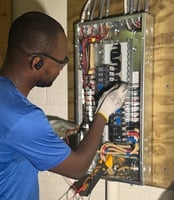As summer temperatures rise, so does the demand on your home's electrical system. With air...
How to Determine Whether Your Electrical System Has Enough Capacity
 Electricity powers almost every aspect of daily life. Everything from your most essential appliances to modern demands such as smart home devices and EVs rely on the power of electricity to keep your life running smoothly. Understanding whether your panel has the capacity to meet current and future power needs is a critical part of keeping your home safe, functioning, and efficient.
Electricity powers almost every aspect of daily life. Everything from your most essential appliances to modern demands such as smart home devices and EVs rely on the power of electricity to keep your life running smoothly. Understanding whether your panel has the capacity to meet current and future power needs is a critical part of keeping your home safe, functioning, and efficient.
Signs Your Electrical System May Be Overloaded
Your home's electrical panel is the backbone of your system. Its role is safely distributing power, and like anything else, there are limits to what it can handle. These are some telltale signs that your household may be pushing your panel beyond its limits:
- Frequent Breaker Trips: Circuit breakers protect your home by cutting power when they sense too much current. If you find yourself resetting breakers frequently, your electrical system may be struggling to keep up with your daily power needs.
- Flickering or Dimming Lights: If lights are flickering or they dim when you turn on an appliance, it could mean your panel is nearing capacity.
- Overuse of Power Strips: Relying on multiple power strips and extension cords can indicate that your home does not have enough outlets to distribute power efficiently.
How to Evaluate Your Home's Power Requirements
No two households are identical, and your home will have unique power demands based on your lifestyle, family size, and the devices you use on a daily basis. Taking stock of your electrical usage gives you a roadmap for determining whether your current electrical panel can meet your needs. Here's how you can assess your home's baseline power requirements:
- Identify Major Appliances: Large appliances like HVAC systems, refrigerators, and electric water heaters consume significant amounts of electricity. Make a list of everything that requires power in your home.
- Check Power Ratings: Most appliances have wattage or amperage labels that indicate how much energy they use. Adding up these numbers provides an estimate of your total power consumption.
- Calculate Your Load Capacity: Your electrical panel should comfortably handle peak usage times without reaching maximum capacity. When your estimated power consumption gets close to what your panel can deliver, it might be time to consider an upgrade.
What Happens During a Panel Assessment & Why You Should Get One
 Not sure if your electrical system can keep up with your growing power needs? A professional panel assessment gives you a clear picture of your home's electrical health. When you schedule this service, your electrician will:
Not sure if your electrical system can keep up with your growing power needs? A professional panel assessment gives you a clear picture of your home's electrical health. When you schedule this service, your electrician will:
- Look at your panel's total capacity to check if it meets today's electrical code requirements and your household's needs.
- Examine your home's wiring for outdated materials or installation methods that might create safety issues.
- Spot signs of wear and damage like discoloration, rust, or loose connections that could affect how reliably your system delivers power.
Understanding Heavy-Ups: When Your Home Needs More Power
A heavy-up is an upgrade for your electrical panel that increases your home's total available power. If you live in an older home, you may still have a 100-amp service panel, which usually falls short for today's households. Upgrading to 200 amps or higher gives your system the capacity to safely handle all your current demands with room for future additions. 
For homes with growing electrical demands, especially ones adding electric vehicle chargers or additional appliances, a panel upgrade covers all your current and future bases.
Considering an Electrical Upgrade? Wilcox Electric Can Help
When your electrical panel can't meet your energy needs, you need reliable answers about your options. Wilcox Electric provides panel assessments and expert heavy-up services to make sure your home's electrical system stays safe while meeting your growing power demands.
Contact us to schedule a consultation and learn more about the right electrical solutions for your needs.




